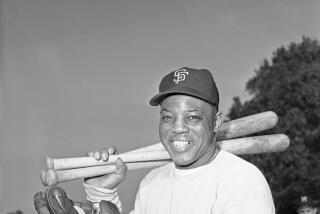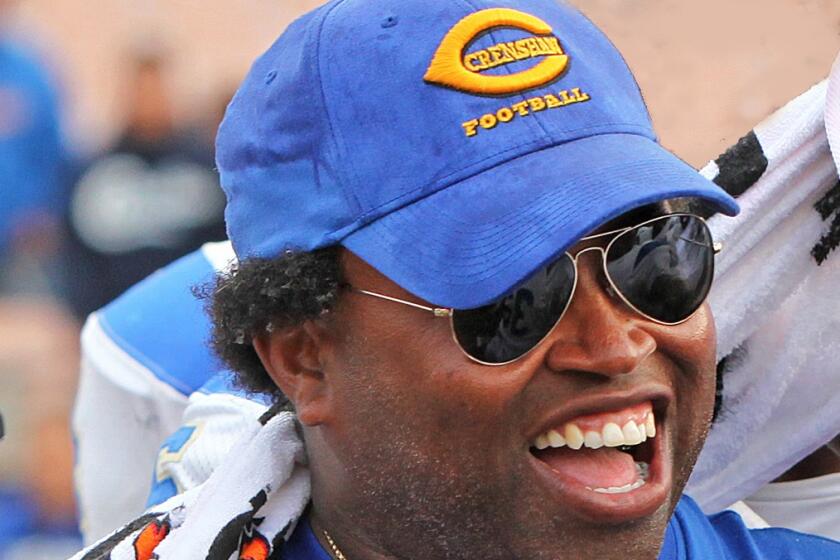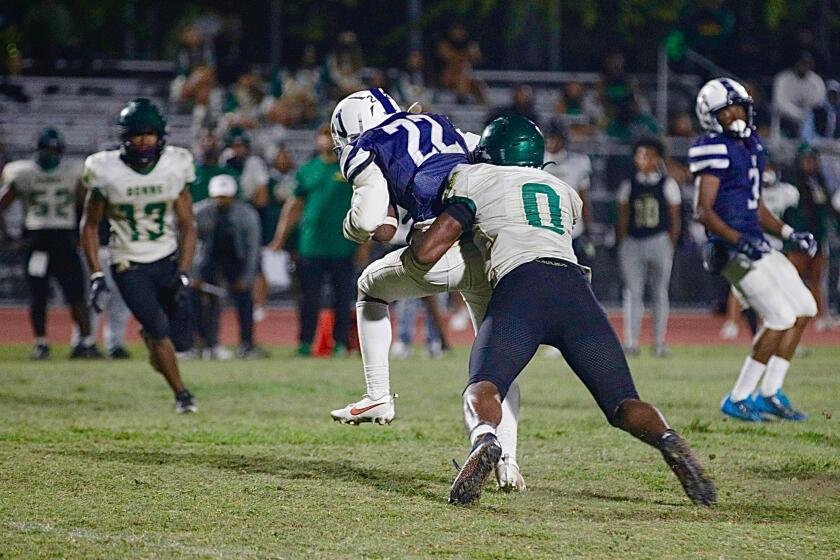Baseballâs early black players faced injustice, humiliation and now a curious grad student

Former major league player and manager Dusty Baker talks about Hank Aaron, hate mail and an anthrax scare in a video provided by Neftalie Williams and the Annenberg Institute of Sports Media and Society.
The project called for patience, perspective and, perhaps most of all, a deep love of baseball. The last part was what made Neftalie Williamsâ presence here, next to a baseball complex in Compton, so peculiar.
Williams was there to interview Don Buford, subject No. 5 out of 111 in a quixotic mission: Over the next few years, itâs Williamsâ job to interview, record and catalog every living African American player from the turbulent first 25 years of Major League Baseballâs racial integration, from 1947 to 1971.
Already, Williams and Daniel Durbin, the USC professor who created the project, have heard about old injustice and lasting humiliation. Many of the stories had never been told before. Others wonât be told until later, having been tucked away into a âdead file,â which, Durbin explained, consists of stories the researchers have been told âyou can only release after Iâm dead.â
Many of the recollections are serious in nature, but others are about clubhouse characters, the greatness of Willie Mays and theories on the running game.
You would think it was a job for a baseball fanatic. Except until very recently, Williams admitted, he had never heard of Buford or many of his contemporaries.
When Williams started, Durbin said, âhe had no background in baseball whatsoever.â
But what the USC graduate student did have was an academic background, voracious curiosity and gushing enthusiasm.
Williams grew up not with a glove but with a skateboard, and he typically zips around on his longboard, dreadlocks flapping in the breeze. This semester, he is teaching a class at USC thatâs likely the first of its kind â on skateboarding and diplomacy.
He has long known about ollies â a boarding trick â but knew nothing of âDowntownâ Ollie Brown, who played for six major league teams in the 1960s and â70s and who was interviewed not long before he died in April of this year.
Even so, players say they find themselves opening up to Williams.
âYou come away thinking, why did I tell that guy all of that?â said Dusty Baker, who played for the Dodgers and three other big league teams before a long career as manager. âHe prods without pushing.â
To Williams, each player helps form a living bridge to an important era in black history, with contributions that span beyond baseball.
âI want to go back and let those dudes say how they felt,â Williams said, âwhat was happening, talk about how much they loved baseball, talk about how much it meant to them.â
::
The year was 1962, three years after Buford had been signed as a free agent out of USC and one year before he would make his big league debut with the Chicago White Sox.
Buford, who was raised in Los Angeles and attended Dorsey High and Los Angeles City College, had left his minor league teamâs bus in order to get a teammate, Deacon Jones, from a mom-and-pop gas station somewhere in Georgia.
When he entered, Buford encountered a standoff.
âThe guy behind the counter pulled out a shotgun and said, âGet this ⌠out of here! Iâll blow his brains out!ââ Buford recalled, quoting the manâs use of the N-word.
Back on the bus, Buford said he chewed Jones out for not knowing better than to enter an all-white store in the Deep South.
âWhat did you do that for?â Buford said he asked him.
Now, decades later, Buford looked up at Williams, the pain not yet gone.
âDeacon just said, âMan, I forgot.ââ
This was the type of anecdote Williams came to collect, raw and buried.
As Buford spoke, Williams largely remained silent. It is a conscious effort, Williams said, because his mind works more quickly than his mouth.
When Williams gets passionate about a subject, which happens frequently, his thoughts tumble out into blurted sentences, which can splinter into more ideas, and their purpose sometimes doesnât completely form until some time later. He apologizes often for rambling.
At the end of one of those streams, Williams explained why he thinks the players trust a skateboarding academic half a century their junior.
âI know that those are questions that I can ask that maybe other people might not be able to ask,â he said, âbecause I know what that feels like.â
Williams grew up in Springfield, Mass., the son of a single mother. He was enrolled in the cityâs desegregation busing program, which brought mostly black students from the city to mostly white schools in the suburbs. He was the only black student in his elementary school and, if that didnât make him stand out enough, his mother dressed him in a suit for the first day of school.
âI want them to know that this is what black people look like,â she told him. âThat we can wear suits and that we can get good grades and that weâre just as good as they are.â
Williams recalled sulking home soiled in dirt.
What did you do? his mother asked.
Someone had called him a slur.
âI donât want you fighting and getting in trouble,â his mother said. âBut if somebody does that, sock âem.â
Williams said, from first grade until eighth, he turned up most days with his clothes dirty from another skirmish.
His life changed when he discovered skateboarding. It provided a common link to his classmates.
âWe had this new way to talk and this new way to bond,â Williams said.
Years later at USC, when he learned Durbin was looking for an interviewer, Williams thought of skateboarding again. It had changed his life, just as these players had allowed baseball to change theirs.
âThese guys matter,â Williams said. âBlack America, they had them on their backs. And the players knew it.
âThey might not say it, because these guys are all really humble, but they know. And I will tell you that when the cameraâs off and Iâm breaking down and we are talking, thatâs the thing, they say: âYou knew you had it on your backs.â Just like I had it when I was a kid and my mom said, âHey, you have to wear a suit and you have to do well because you have the culture on your back.ââ
He paused.
âSorry, sorry,â he said. âI didnât mean to get so crazy. Sorry. I get passionate.â
::
Williams carries a black notebook with him everywhere, using it to record thoughts and stories and tally up the growing number of players heâs spoken with.
One of his most recent entries is about Baker, who was born in Riverside and whose career as a player and manager spanned parts of six decades.
Baker told of the time when he was managing the Chicago Cubs that the FBI showed up at Wrigley Field because they thought theyâd found anthrax in his mail. Baker also recounted that former Atlanta Braves teammate Hank Aaron warned him not to grow too close with him as Aaron chased Babe Ruthâs career home run record, lest he endanger his own life.
Williamsâ questions are open-ended, and the subjects can quickly jump from the mundane to the horrifying. Some players have held on to painful memories for decades. Other stories seem to be jarred out of some forgotten part of the mind.
Tom Hall, who played for four teams over a 10-year major league career, said he told Williams stories he hadnât told anyone but his wife.
âPeople just donât ask about it,â Hall said. âItâs a lot of things that you get off your chest, that youâve been thinking about.â
It was Durbin who decided the collection must be comprehensive. Every player, he said, brings a different perspective, and every story is valuable.
The expenses â Williamsâ salary, travel and equipment costs â run about $140,000 a year and are funded by donations. At the end of what Durbin expects will be a five-year process, the project will host a digital library with videos indexed for researchers.
Williams has been working on it for slightly more than a year, but already he gushes with a growing baseball knowledge. He has thoughts on the Kansas City Royalsâ ability to steal so many bases, plus theories on the declining number of black players in the game, and why, among baseballâs pioneers, the public seems interested only in Jackie Robinsonâs story.
Still, it is the personal that he is after, the list of 111 unique stories that, he fears, could grow shorter each day.
In January, shortly before Williams was set to interview him, Ernie Banks died.
Williams became upset, and his resolve hardened. âItâs sort of just fading away,â he said of the history. âThose are the important things.â
He paused and tapped the notebook.
âItâs not just about baseball.â
More to Read
Go beyond the scoreboard
Get the latest on L.A.'s teams in the daily Sports Report newsletter.
You may occasionally receive promotional content from the Los Angeles Times.











